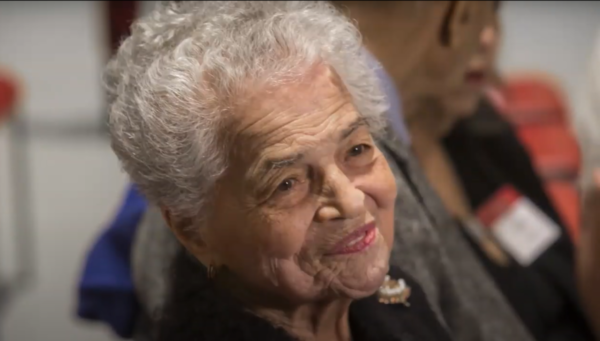Cincinnati Unveils Statue of Local Civil Rights Activist Marian Spencer
The city of Cincinnati, Ohio has unveiled a statue of civil rights activist Marian Spencer on the day before what would have been her 101st birthday.
The life-sized sculpture, unveiled on June 27 at John G. & Phyllis W. Smale Riverfront Park, is the first named statue of a woman in the city.
Spencer, a champion for civil rights, was the first Black woman to serve on the Cincinnati City Council and the first Black female vice mayor, and led efforts for racial equality for decades before she died in 2019 at age 99, months after the statue was first proposed.
“Marian deserves this honor, as she was an extraordinary woman of grace and dignity who dedicated her life to standing up for equality, justice, and her belief that each of us has the ability — and responsibility — to make the world a better place,” said Marian A. Spencer Statue Committee Chair Alice Schneider, who proposed the statue .
Schneider is also a member of the Woman’s City Club, which commissioned the statue after raising $175,000 from 250 donations, surpassing the goal of $125,000.
“It’s been a dream of mine to have a statue of a woman. There are maybe close to 100 statues of men in and around Cincinnati and not one of a named, real woman,” Schneider said, The Cincinnati Inquirer reported. There are no other statues of women based on real historic figures in Cincinnati.
The statue, sculpted by Tom Tsuchiya and Gina Erardi, is complemented by two children to symbolize Spencer’s work with youth and the way she will inspire new generations. It was scheduled to be unveiled last summer but was delayed because of the pandemic.
The granddaughter of a former enslaved person, Spencer’s fight for civil rights began in 1952 when she led desegregation efforts at Coney Island Amusement Park when her children were not allowed to go to an event at the park after a representative admitted the event was not open to Black children. With the help of the NAACP, Spencer filed a suit against the park and won a victory when it was desegregated.
Spencer went on to chair the Cincinnati NAACP Education committee for 20 years, pursuing educational equity, and served as chapter president of the NAACP of Cincinnati between 1980 and 1982 before joining the City Council in 1983.
Spencer pushed for the integration of pools, schools and summer camps for children, as well as the integration of dorms at the University of Cincinnati.
The Cincinnati Chamber of Commerce named Spencer a “Great Living Cincinnatian” in 1998.
“She was congenial and friendly, but at the same time, she could get things done,” said Schneider, who got the chance to know Spencer before she passed away. “You knew you were working with somebody who was strong and dedicated.”

